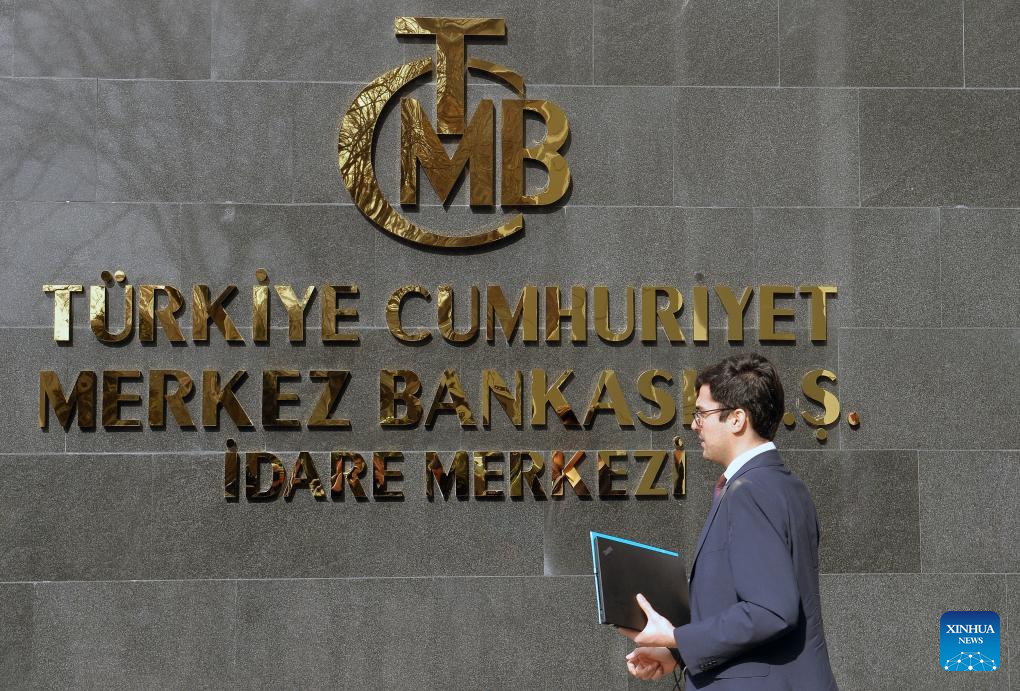
A man walks past the logo of Turkish central bank in Ankara, Türkiye, on April 2, 2024. (Mustafa Kaya/Handout via Xinhua)
by Burak Akinci
ANKARA, April 2 (Xinhua) -- Türkiye needs to focus on further its monetary tightening to curb chronic inflation and achieve sustainable results to mitigate the burden of a cost-of-living blow on its citizens, a Turkish analyst said.
"Türkiye's inflation is so difficult to break down that more rate hikes will be needed," Atilla Yesilada, a veteran Istanbul-based economist, told Xinhua in a recent interview.
Yesilada, also a country advisor at business management consultancy Global Source Partners, said that in his view, in its next two meetings this month and in May, the Turkish central bank will hike its benchmark rate by 500 basis points by meeting to peak at 60 percent.
Surprising the markets, the bank increased its key policy rate by 500 basis points on March 21, bringing it to 50 percent, following a brief monthly pause, which led analysts to believe that new hikes may be on the table in coming months.
The bank's move came in response to a "deterioration in the inflation outlook," as consumer prices are still very high in Türkiye despite a monetary tightening policy since mid-2023.
Annual inflation was recorded at nearly 70 percent in February, the highest level in 15 months, and is expected to peak further until June.
Even at 50 percent, interest rates are considerably below inflation.
According to Yesilada, Türkiye should swallow the bitter pill sooner rather than later before inflation's outlook deteriorates.
"The whole idea of going slow or gradually in the economic stabilization program to engineer a soft landing will not work in Türkiye," he pointed out.
In his view, the only way the government can deal with inflation is to smash domestic demand, and the way to do that is to go very fast with monetary policy and hike rates to a level that will squeeze domestic demand.
The Ankara government is targeting 36 percent inflation for the end of this year, but most economists think it will be missed.
So does Yesilada, but he is optimistic that disinflation would eventually be achieved with further monetary tightening and "sacrifice" from all segments of the population.
"Sacrifice is needed to achieve disinflation... But sacrifice has to be shared by all, not only the poor," the analyst said, calling on the government to cut public spending to meet its ambitious macroeconomic targets.
On Monday, Treasury and Finance Minister Mehmet Simsek said on his X account that the government's "commitment to achieving and sustaining macroeconomic stability is stronger than ever."
"Attaining price stability is our top priority. In addition to tight monetary and income policies, we will prioritize expenditure control to restore fiscal discipline," he added.
To curb stubborn inflation, the Turkish central bank increased the key policy rate by 41,500 basis points since June 2023, as the country abandoned its years-long low-interest rates policy to adopt a dramatic monetary tightening.
High interest rates have failed to stabilize the currency. Since the start of this year, the Turkish lira has fallen by 8 percent and now stands at a record low of around 32 Turkish lira to the U.S. dollar.
For many years, President Recep Tayyip Erdogan supported the view that high interest rates were not a cure for inflation but were rather its cause.
However, when inflation took off, the economy overheated, and the currency plummeted, the Turkish leader appointed a new economic team that reversed monetary policy.
Meanwhile, in the wake of local elections held on Sunday in Türkiye, the local press has reported that new fiscal measures may be implemented to secure disinflation, such as tax increases and significant hikes in utility prices that may hurt households further.
"For us economists, a sharp pain is better than continuous pain, whatever needs to be done should be done immediately," Yesilada said. ■



